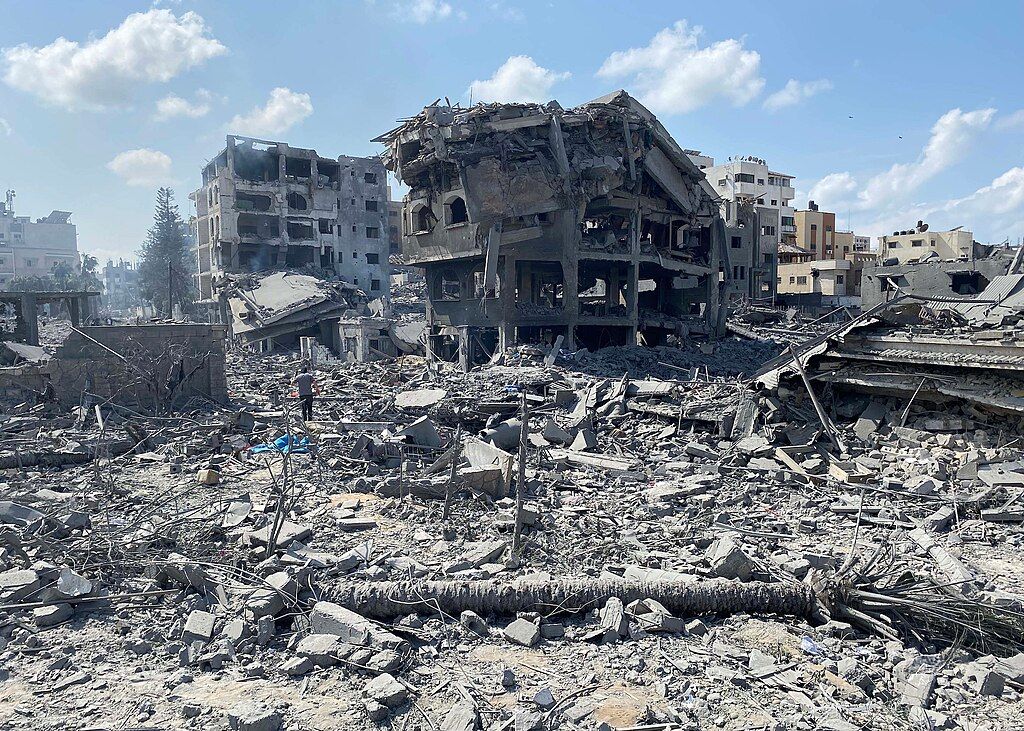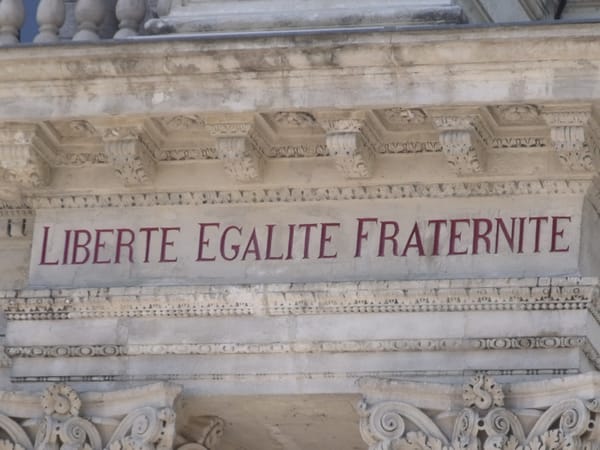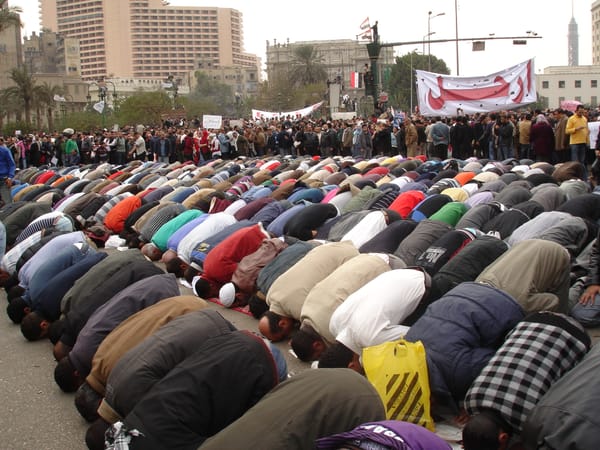Western Liberals Need to Extend the Same Humanity to Gaza as They Did to Ukraine
Western liberals have not extended the same solidarity to the Palestinian people that they did to the Ukrainians.

Although it came after months of warnings by US intelligence agencies and even President Biden, the Russian invasion of Ukraine shocked many who assumed that such an event was not possible on the borders of the EU. Ukrainian flags popped up around the world—projected onto buildings, sprouting from homes and lawns, and flown atop landmarks around the world. After the West got its footing, plans were drawn up first to give Ukrainians what they needed to protect Kyiv and then to help Ukraine liberate its territory—a goal which at the time enjoyed bipartisan support in the United States, with only a few extremes on the left and right seriously questioning Ukrainians’ right to self-determination. Images of executed bodies in Bucha and destroyed cities like Mariupol only strengthened this resolve. President Zelenksyy became an overnight household name and his speeches were broadcast around the world. The US, Western Europe, and much of the rest of the world embraced Ukrainian resistance to occupation as a worthy cause.
But this fall, we Western liberals have not extended the same solidarity to the Palestinian people, who are suffering a fate much like that of the Ukrainians subjected to the initial Russian onslaught. This is a failure which will cost us if not remedied. Not only is the suffering of Gazan civilians a moral stain on the world order and especially the American conscience, but it also undermines liberals’ claim to abide by universal principles and the rules-based international order. The situations are not identical, but similar enough for both a self-reflective public and a critical global audience to see. Where Ukrainians needed and still need weapons and aid to defend themselves and rebuild their country, Palestinians need a humanitarian pause and negotiated ceasefire now, and sweeping structural changes to enjoy free and dignified lives in the long term.
It is of course important not to overstate the similarities between the two situations. Ukraine and Russia have a centuries-longer history than Israel and Palestine, and a more complex one, featuring periods of relative cooperation as well as attempted outright destruction of the Ukrainian people. By contrast, the history of the Israeli state is much shorter, and its relation with the Palestinian people since the 1948 war of independence has almost universally been one of dispossession and displacement of hundreds of thousands of Palestinians from their homes. And while Ukraine has never fully escaped from Russian meddling in its politics and economy, it has enjoyed at least a de jure independence that has eluded Palestinians for their entire existence as a people.
On the other hand, many, especially liberals, would be quick to point out that whatever the flaws in Ukraine’s democracy, it has managed peaceful elections and a transfer of power, leading to the administration of a popular president. By contrast, Hamas was last elected with a slim plurality of Palestinian voters 17 years ago and has ruled as an effectively one-party state—despite a lack of apparent popularity—in Gaza ever since. Moreover, even the most politically extreme elements of Ukraine’s military never invaded Russia, and the years leading up to the 2022 invasion were mostly free of the kind of atrocities visited by Hamas on Israel in October of this year. The brutality of these attacks, which fell primarily on Israeli civilians, broadly discredited Hamas as a partner in peace negotiations, and the shock has provided a great deal of cover for the worst Israeli excesses in the following weeks. Russia’s invasion of Ukraine lacked any kind of comparable provocation. But these differences and earned hostility towards Hamas ought not distract us from our humanistic obligations to Palestinian civilians.
Indeed, despite the differences in situation, there are striking similarities that should make supporters of Ukraine recoil at the scale and ferocity of the current Israeli response. Russia’s destruction of Mariupol and other Ukrainian cities, for example, was consistently justified by rooting out ‘terrorists’ and ‘Neo-Nazis’; in the same way, Israel’s pursuit of Hamas has justified the deaths of thousands of children. One needn’t dive into the relative virtues and villainy of Azov and Hamas to determine that these death tolls cannot possibly be justified by a mission to root out a fraction of a percent of the population. In each case the invading army has used deeply emotional and ethno-religiously charged comparisons—Hamas to ISIS, Azov to collaborators from the Second World War—to shut down reasoned discussion of proportionality. Airstrikes performed by both Russia and Israel are ostensibly justified by the close proximity of civilian and military targets in Gaza and Ukraine, leading in both cases to thousands of avoidable civilian casualties.
It is high time to recognize the humanity of all victims of warfare. The images of bombed-out high rises and shattered hospitals coming out of Gaza could just have easily come out of Mariupol or Severodonetsk a year ago. But the response of too many liberals has been strikingly different. Many of us have extended the benefit of the doubt to the Israeli Defense Forces as they explained the apparent necessity of destroying civilian objects in a way that we wisely did not to the Russian Armed Forces. The affinity for a state that looks much more like our own liberal democracies in the west is understandable, but liberals with a sense of history should understand that militarism and the desire for territorial expansion can lead institutions ostensibly rooted in liberal values to commit atrocities.
There are obstacles, of course. One is that American voters have long sympathized with Israel over Palestine, and even as this sentiment undergoes generational shifts it is not reflected in Congress. Changing that will require lobbying and political pressure—and it will require working with people and organizations who have spent the last twenty months actively working against the effort to defend Ukraine. For example, though the Democratic Socialists of America has been at best lukewarm on defending Ukraine, and even as their International Committee has openly called for an end to US aid in Ukraine’s defense, DSA-linked politicians are still largely at the forefront of calling for restraint in Gaza and need support from the liberal majority in the Democratic party. Fortunately, the two causes, far from competing, are complementary. Right now, what the Palestinian people need is simply a pause to bombing to blunt the impact of epidemic disease and malnutrition that is inevitably going to strike Gazans who count in the dozens the trucks trying to supply their enclave of two million people and struggle to maintain even the basic necessities of life, such as an adequate flow of clean water. In the coming months Palestinians need the US to be willing to use its aid to Israel—and the possibility of suspending it—as leverage to demand a humanitarian pause to aerial bombings, especially of ‘safe zones’, provision of humanitarian supplies, and an emphasis on proportionality and adherence to international law. None of these goals require giving an inch on Ukraine; indeed, is it those demanding unlimited support to Israel that would see the two causes compete for artillery shells, rockets, and the like. The sooner Israel ceases its bombing and shelling in Gaza, the more ammunition can be sent to Ukraine. Beyond the question of materiel, moving the foreign policy of western countries in the direction of greater consistency in applying international law and the basic demands of humanity would advance all of our other diplomatic interests. The overwhelming majority of states in the UN voted to support a ceasefire in Gaza—aligning US and European policy better with this position will make finding allies in future diplomacy easier.
In the longer term, of course, Ukraine and Palestine are qualitatively different in terms of their complexity. Ukraine’s allies have a simple task—give it the supplies and economic support it needs for conventional victory. Success in Palestine requires more nuance—Israel’s allies need to be more willing to tie repeated rounds of military aid to Israel, as well as cooperation in cutting-edge military systems and veto protection in the UN security council, to a systemic shift in how Palestinians in both Gaza and the West Bank are treated by the Israeli state. The carte blanche approach adopted up until now has only moved us further from the stated US policy of a two state solution. While the end state for the conflict is harder to both imagine and achieve than that of Ukraine—where the solution is simply a return of occupied territory to an already functional government—we should view Palestinian lives and aspiration as deserving the same respect and legitimacy that most westerners have seen in Ukrainian ones over the last two years.
The Russian invasion of Ukraine was met with a show of strength and solidarity on the part of western liberalism. Protecting the safety and dignity of the Palestinian people will require a very different kind of effort, but it should be animated by the same sense of humanity and ideals of international cooperation.
Featured Image is Damage in Gaza Strip in October 2023




